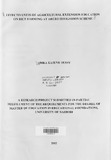| dc.description.abstract | This study aimed at assessing the effectiveness of agricultural extension education on rice
farming at Ahero irrigation scheme. Specifically, the study focused on: the type of
agricultural extension education provided to rice farmers at Ahero irrigation scheme,
organizations and agencies providing agricultural extension education, strategies used in
providing agricultural extension education extent to which rice farmers at Ahero
irrigation scheme participate in agricultural extension education and the impact of
agricultural extension education on rice farming at Ahero irrigation scheme.
This study used case study design where both qualitative and quantitative data was
collected. Interview schedules were used to collect data from the district agricultural
extension officer of Muhoroni and two heads of departments of Ahero irrigation rice
scheme all of whom were purposively sampled. Questionnaire was used to collect data
from fifty rice farmers in the scheme. The farmers were randomly selected to participate
in the study.
Data obtained from open-ended items in the questionnaire and interview schedules were
analysed and reported qualitatively through narrative form. Data obtained from closeended
items were analysed and presented quantitatively through frequency tables and
percentages. Some of the key findings of the study were that: 94 percent of the farmers
indicated that they had been provided with agricultural extension education. The
respondents also indicated that a number of strategies had been used to provide
agricultural extension education to rice farmers in the scheme including : field days, use
of group leaders, group or team work, visiting other rice irrigation schemes, lectures by
experts, use of pamphlets and videos and also the use of workshops and seminars.
Furthermore, the district agricultural extension officer indicated that the agricultural
extension education had a great impact on rice farming as it had increased rice production
from 10 bags to 20 bags per acre of land .
From the findings of the study, conclusions were derived indicating that majority of the
farmers were involved in agricultural extension education programmes . However, a
certain percentage of the farmers were not involved in such programmes . In addition, the
agricultural extension education provided to farmers at Ahero rice irrigation scheme was
effective despite facing a number of challenges which need to be addressed. Based on the
findings and conclusions, recommendations were made including the need for the scheme
management to involve farmers in the scheme to come up with suitable criteria that will
ensure participation of all farmers in agricultural extension education programmes. The
organizations and agencies providing agricultural extension education to rice farmers in
the scheme should promote the use of modern technology such as mobile phones in
giving information to rice farmers. Moreover, the management of the scheme should
partner with other stakeholders to ensure that all farmers in the scheme embrace new
methods of farming and marketing of their produce in order to enjoy maximum benefit. | en |

